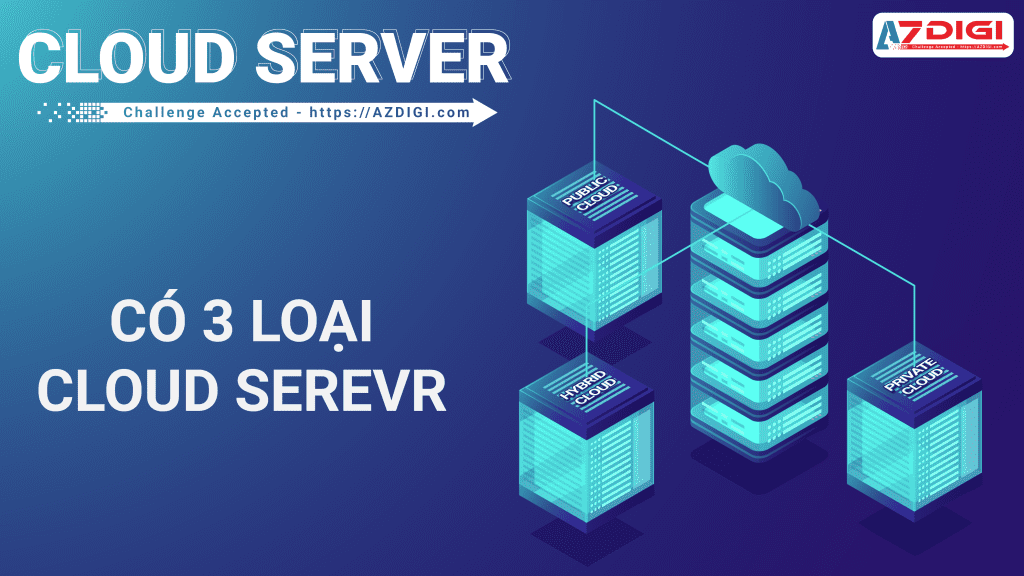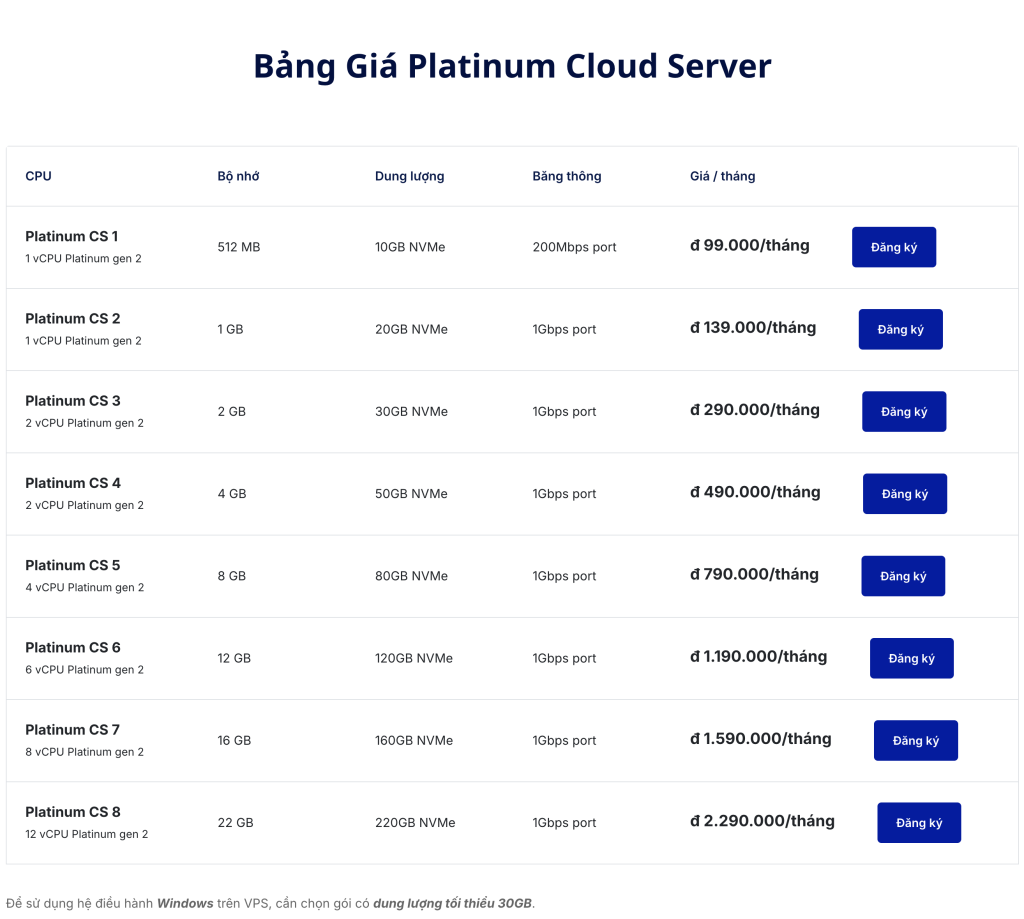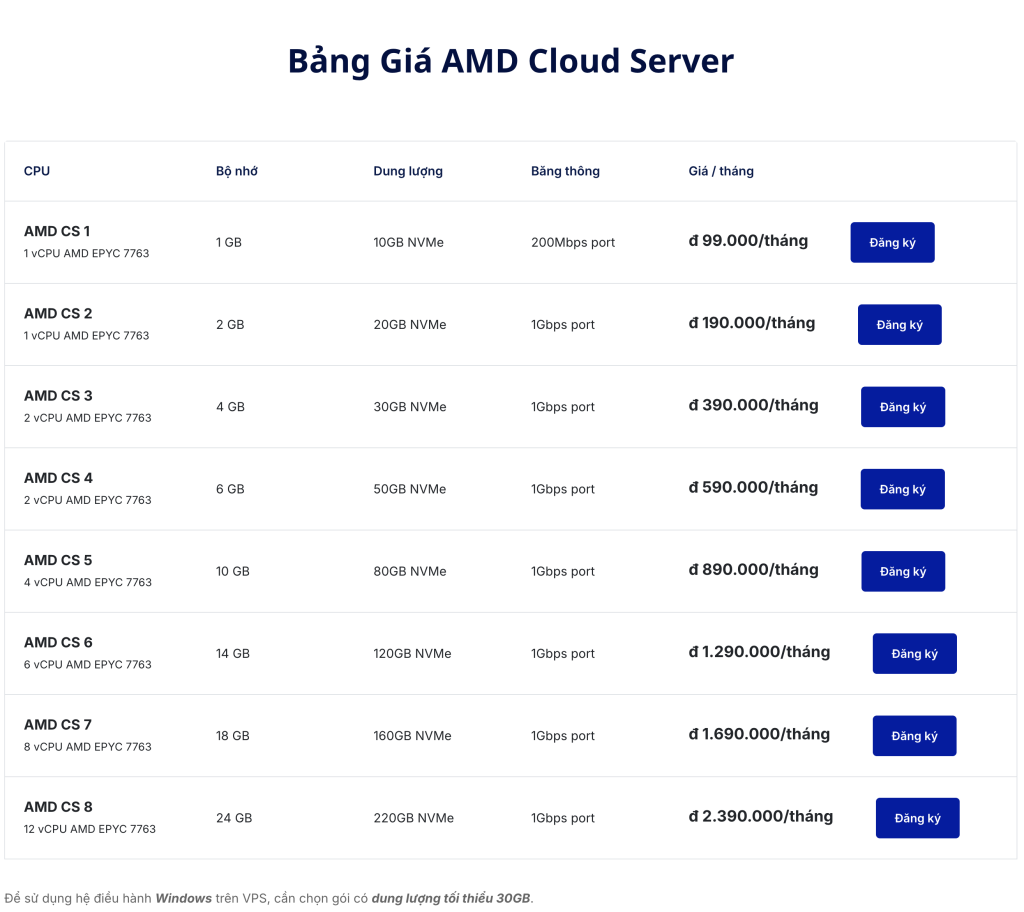Nội dung
Cloud Server is one of the most modern data storage and processing solutions today, designed to meet the increasing demands for performance, security and scalability of businesses and organizations. Let’s learn about Cloud Server and Cloud Server applications in businesses in the article below.
Overview of Cloud Server
Definition of Cloud Server
What is Cloud Server?

Cloud server is a modern, integrated infrastructure technology solution for storing, managing and distributing data through a network system. Like traditional physical servers, cloud servers provide the necessary processing power and storage space. However, the important difference is that cloud servers are supported by cloud computing technology formed by many different servers, providing superior flexibility and scalability.
Cloud servers not only serve as data storage but also act as a bridge, allowing remote sharing and access of information between devices. This helps businesses optimize performance. due to its flexible scalability, reduced service interruption time (downtime) due to the infrastructure being connected by many server systems, quick deployment and saving operating costs. Cloud server also supports many different operating systems such as Windows, Linux, … providing flexibility and easy compatibility with customers’ existing systems.
With its outstanding advantages, cloud server has become the top choice for businesses looking for advanced technology solutions.
The difference between cloud server and traditional hosting solutions.
Traditional storage solutions such as Hosting, VPS, physical servers (Servers),… and Cloud servers all have their own advantages and disadvantages, depending on the specific needs and goals of the business.
| Criteria | Cloud Server | Traditional storage solutions |
| Structure and Infrastructure | Built on a cloud infrastructure platform, where resources such as CPU, RAM and storage are virtualized and distributed over the network. Resources are not dependent on a specific hardware but are provided from many different physical servers, enhancing resilience and availability. Customers can easily access and manage resources from anywhere with an internet connection. | Uses physical servers and storage systems located on-premises or at a provider’s data center. Resources are tied to specific hardware, leading to the risk of service disruption if hardware fails. This solution often requires a physical presence for management and maintenance. |
| Data Security | Cloud Server’s centralized and distributed storage system provides high data security. Because data is stored distributed on many different servers, along with the Replicate mechanism, the risk of data error or damage when the storage hardware is damaged is minimized. broken. | Data is stored directly on the server’s hard drive without going through an encryption step. If the server’s hard drive fails, it will affect the data stored on it. |
| Scalability | Flexible and easy to scale resources as needed without investing in new hardware. Ideal for businesses with fluctuating resource needs or looking to experiment with new applications. | Scaling up resources often requires purchasing and installing new hardware, which can be time-consuming and expensive. This solution is less flexible than cloud servers in meeting changing needs. |
| Expense | Costs are calculated on a pay-as-you-go model, allowing businesses to optimize costs based on actual needs. No need for large initial investments in hardware and infrastructure. | Initial investment in hardware and infrastructure is often high. Maintenance, upgrade and operational costs can also be high, especially when expansion is required. |
| Security and Management | Cloud server providers often offer advanced security features such as data encryption, access control, and protection against DDoS attacks. System management and maintenance are often handled by the provider, taking the burden off the customer. | Security depends on the ability of the business to protect its infrastructure and data. To effectively manage and maintain the system, the business needs a professional IT team. |
| Performance and Availability | Known for high reliability, with data backup and recovery options and high fault tolerance due to distributed infrastructure. Service availability is often guaranteed through service level agreements (SLAs) with the provider. | Performance can be affected by hardware configuration and physical factors such as temperature and power. Availability depends on effective system maintenance and management. |
How Cloud Server Works
How cloud server works.
Cloud servers operate on cloud infrastructure platforms, where computer resources such as CPU, RAM and storage are virtualized and distributed over the network. This provides the ability to effectively expand server resources, as well as enhance data security because the storage system will distribute data across many different servers, ensuring high availability.
The cloud server system consists of two main parts: front-end and back-end .
- The front-end is the interface and applications that users use to access the cloud server. This is the connection point between the user and the cloud system.
- The back-end is the supporting part of the system, which includes multiple computers, hardware, cloud servers, and data storage systems. These components are connected via a private network, and work together to form a distributed network of resources.
When you deploy a cloud server, the service provider sets up a virtualized environment on their infrastructure. This allows you to manage resources remotely and adjust storage or memory flexibly without having to invest in new hardware.
All the features and functions of the cloud server system are managed by the central server . Cloud server systems often come with advanced security features and management tools, which help protect data and reduce the maintenance burden for users.
Types of Cloud Servers and how each type works:
There are 3 types of Cloud Server: Public Cloud, Private Cloud, and Hybrid Cloud, each with its own operating mechanism.

There are 3 types of Cloud Server: Public Cloud, Private Cloud, and Hybrid Cloud
Public Cloud
- How it works : Resources are shared among multiple users (multi-tenancy) and managed by a service provider. Users access via the internet and only pay for the resources they use.
- Security and control : Little direct control, security is primarily managed by the vendor.
Private Cloud
- How it works : Dedicated resources for an organization, can be managed internally or by a third party. Fully customizable to business needs.
- Security and Control : The organization has full control and security settings according to its own requirements.
Hybrid Cloud
- How it works : A combination of Public Cloud and Private Cloud, allowing data and applications to move between two environments. Optimize costs and performance by using both types of clouds.
- Security and control : Direct control of resources on Private Cloud, integrated security for data transferred between environments.
See more : Difference between Public Cloud and Private Cloud
Main components of a cloud server system.
Main components of the Cloud Server ecosystem
To exploit all the above benefits of Cloud Server for businesses, many different services in the cloud ecosystem will be needed to complement each other. Normally, a popular cloud ecosystem today includes the following services:
Virtual Server (Compute)
The first basic service required in a Cloud system is a virtual machine, which is also the main service that customers must use to deploy their applications.
In a cloud system, virtual machines can connect to other services (if any) for use without deploying additional software on the virtual machine, reducing the load to increase performance.
For example, instead of installing MySQL on the server, customers can connect the server to the Database Services service on that cloud infrastructure to use.
Of course, not many cloud services can fully meet these software requirements today.
Networking Infrastructure
- Load Balancer : Distributes load between servers to ensure system performance and reliability. Enhance performance for usage needs that cannot be met using a single virtual machine.
- Firewall : Protects the system from external threats by controlling the flow of data in and out.
- VPN (Virtual Private Network) : Ensures secure connection between users and cloud systems.
Storage and Database Services
- Object Storage : Like Amazon S3, allows storing data as objects, suitable for storing unstructured data.
- Block Storage : Like Amazon EBS, provides block storage, commonly used for file systems and databases.
- Database Services : Database services like MySQL, PostgreSQL, MongoDB are deployed on the cloud.
Security
- Identity and Access Management (IAM) : Manage users and access to cloud resources.
- Encryption : Encrypt data to protect sensitive information during storage and transmission.
- Monitoring and Logging : Monitor and log system activity to detect and respond to security incidents.
Management Tools and Services
- Automation Tools : Like Ansible, Puppet, Chef, to automate infrastructure deployment and management.
- Monitoring Tools : Like Nagios, Zabbix, Prometheus, to monitor system performance and health.
- Backup and Recovery : Data backup and recovery solutions to ensure data security.
User Interface
- Dashboard : Intuitive management interface to manage and monitor cloud resources.
- API (Application Programming Interface) : Allows integration and automation of cloud resource management through external applications.
Benefits of Cloud Server in Business
Increased performance and scalability
Cloud Server is an ideal solution for businesses and organizations that need flexibility in resource management and high performance in system operation. One of the outstanding advantages of Cloud Server is its flexible scalability, allowing businesses to easily adjust resources according to actual needs without investing in fixed hardware infrastructure. When traffic or workload increases suddenly, the Cloud Server system can automatically expand resources such as CPU, RAM, and storage to meet the demand without interrupting operations. This is especially important for businesses in rapid growth stages or when implementing large marketing campaigns, where the system is required to handle large workloads in a short time.
In addition, Cloud Server also stands out with its high performance, thanks to the use of powerful processors such as Intel Xeon or AMD EPYC, combined with NVMe storage technology, which helps increase data retrieval speed and ensure smooth application operation. The ability to maintain stable performance, even under high load, is a key factor in helping businesses maintain a good user experience and avoid costly downtime.
2.2. Nhu cầu sử dụng đa dạng
In business, Cloud Server can have many useful uses including using it to deploy systems such as ERP, CRM, Intranet, Communication, VPN, Firewall, Webserver,… easily and quickly without having to invest in separate server systems.
2.3. Tiết kiệm chi phí
Reduce initial investment costs and maintenance costs: With cloud servers, businesses do not need to invest heavily in purchasing and installing hardware, building network infrastructure and maintaining the system. Instead, they can rent cloud server services at lower costs and easily expand when needed. Cloud servers are always maintained and managed by providers like AZDIGI, so users do not need to invest in their own IT team to manage and maintain the system. This helps reduce personnel and maintenance costs.
Flexible payment model : The flexible payment model of cloud servers helps businesses optimize costs and manage resources effectively. Flexible scalability makes it easy to increase or decrease resources according to business needs. Users can also pay separately for each type of resource such as CPU, RAM, storage and bandwidth, optimizing costs for each application. Cost management tools and promotions from suppliers such as AZDIGI help businesses control their budgets and experience services at lower costs.
2.4. Tối ưu hóa hiệu suất và tài nguyên
Cloud Server allows users to automatically adjust resources according to demand to avoid wasting resources, ensuring that applications and services always operate at optimal performance. With AZDIGI’s Cloud Server system, users can take full advantage of performance from advanced technologies such as Intel Xeon Platinum and AMD EPYC. In addition, the cloud server system has the ability to distribute loads and automatically switch when there is a problem, helping to maintain high reliability and uptime for important business services. At AZDIGI, the technical department always supports 24/7, ensuring the system operates continuously and stably.
2.5. Hỗ trợ mở rộng toàn cầu
With cloud servers, businesses can quickly expand operations to new markets around the world without having to set up physical infrastructure at each location. Extending resources closer to the end user’s geographic location improves service speed and experience.
2.6. Đảm bảo an toàn về bảo mật
Cloud servers bring many benefits in terms of data security and safety. Data is encrypted during transmission and storage, ensuring that only authorized people can access it. With many advanced security measures such as: Data Encryption, Identity and Access Management (IAM), Intrusion Detection and Prevention Systems (IDS/IPS), Firewall, Backup and Recovery,…
Secure and distributed data storage : Secure and distributed data storage is an important security measure in cloud server systems. Distributed storage means that data is copied and stored in many different locations. This not only enhances security, but also ensures that data can still be accessed and recovered quickly even if part of the system fails. With Enterprise-standard NVMe technology like AZDIGI’s, it provides the fastest data reading and writing performance while still ensuring data security.
3. Cloud Server Applications
Cloud servers have many applications in many different fields, helping businesses and individuals make the most of cloud technology to optimize operations, increase performance and reduce costs.
3.1 Data storage and management
Large data storage and automatic backup capabilities: Cloud server is a data storage solution on the cloud platform. This allows easy expansion of storage capacity when needed without hardware limitations, allowing businesses to store large amounts of data. Data is automatically backed up and secured with encryption measures, ensuring safety and quick recovery in the event of an incident. In addition, accessing data from anywhere with an Internet connection improves flexibility and efficiency in data management, allowing businesses to share and manage information quickly and conveniently.
3.2 Running business applications and software
Cloud Server helps deploy and manage business applications thanks to its flexible scalability, allowing businesses to expand resources such as CPU, RAM, and storage as needed, ensuring that applications and software always have enough processing power to operate smoothly, even when demand suddenly increases. With powerful hardware infrastructure, such as servers using Intel Xeon Platinum or AMD EPYC at AZDIGI, Cloud Server provides high and stable performance for important business applications such as customer relationship management systems (CRM), enterprise resource planning systems (ERP), and other business applications.
3.3 Support for remote working environments
Cloud Server creates a secure and efficient remote working environment, allowing users to easily access data and applications from anywhere with an Internet connection. Cloud Server provides a platform for online collaboration tools such as project management systems, group chat software, and document sharing tools. Employees can work together, share documents, and coordinate work easily and effectively, no matter where they are. Data security when working remotely is important, Cloud Server can ensure this. By providing advanced security measures such as data encryption, multi-factor authentication (MFA), and access rights management (IAM), Cloud Server helps protect business/personal data from cybersecurity threats, even when employees access it from unsecured networks.
3.4 Data analysis and processing
Cloud Server has the ability to analyze Big Data: Cloud server provides powerful computing resources and flexible scalability, helping businesses process large data sets without investing in expensive hardware infrastructure. This ability is especially important when working with complex data sets, requiring large processing power and high memory for effective analysis.
Cloud Servers are capable of processing real-time data and optimizing business processes: Cloud servers support real-time data analysis, allowing businesses to make timely decisions based on the latest information. This is especially important in industries such as finance, retail, and healthcare, where quick decision making can provide a major competitive advantage.
AZDIGI – High quality Cloud Server
Platinum Cloud Server integrates high-end CPU Intel Xeon Platinum gen 2
Platinum Cloud Server is a high-end server solution with many outstanding features, bringing superior performance and convenience to businesses. AZDIGI is a virtual server rental unit, providing service packages with prices starting from only 99,000 VND/month. Users can initialize the server immediately. Equipped with a powerful Intel Xeon Platinum Gen 2 processor, ensuring fast and smooth processing. NVMe hard drives are used to increase data retrieval speed, helping your applications and services operate optimally.

AMD Cloud Server uses AMD EPYC Gen 3
AMD Cloud Server at AZDIGI is a high-end server solution with outstanding features, providing powerful performance and flexibility for businesses at a cost of only 99,000 VND/month. The server uses high-end AMD EPYC Gen 3 (Milan) processors, specifically AMD EPYC 7763 with speeds from 2.4GHz to 3.5GHz, ensuring good handling of needs that require powerful processing cores.

Users can instantly initialize the server and use NVMe hard drives, which helps increase data retrieval speed and improve system performance. The AMD Cloud Server control panel is designed to be easy to use, providing full administrative rights, allowing for efficient server customization and management.
Conclusion
Cloud Server has become an advanced and effective solution for managing and processing data in today’s digital environment. With flexibility, scalability, and powerful security features, Cloud Server meets the needs of small and large businesses with complex requirements. Understanding the applications of Cloud Server in business will help you maximize the benefits that Cloud Server brings and optimize business operations in the most effective way.

